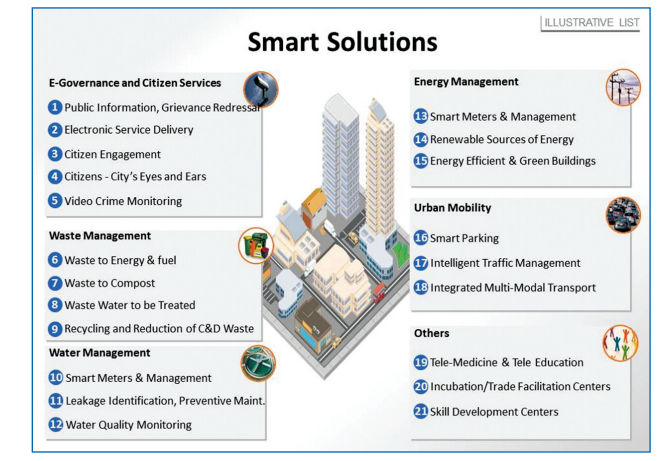Union Cabinet Approves 12 New Greenfield Industrial Smart Cities
About Smart Cities Mission
- The Smart Cities Mission was launched in 2015.
- The main objective of the Mission is to promote cities that provide core infrastructure, clean and sustainable environment and give a decent quality of life to their citizens through the application of ‘smart solutions’.

- The Mission aims to drive economic growth and improve quality of life through comprehensive work on social, economic, physical and institutional pillars of the city.
- The focus is on sustainable and inclusive development by creation of replicable models which act as lighthouses to other aspiring cities.
Coverage
- The mission will cover 100 cities that have been distributed among the States /Union Territories (UT) on the basis of an equitable criteria.
- Each State/UT will have a certain number of potential Smart Cities, with each State/UT having at least one.
Funding
- The Mission is operated as a Centrally Sponsored Scheme.
- The Central Government gives financial support on an average Rs.100 crore per city per year. An equal amount on a matching basis is to be provided by the State/Urban Local Bodies (ULBs).
- Additional resources are to be raised through convergence, from ULBs’ own funds, grants under Finance Commission, innovative finance mechanisms such as Municipal Bonds, other government programs and borrowings.
- Emphasis has been given on the participation of the private sector through Public Private Partnerships (PPP).
What are Smart Cities?
- There is no standard definition or template of a smart city.
- In the context of our country, the six fundamental principles on which the concept of Smart Cities is based are:

Implementation by SPV
- The implementation of the Mission at the City level will be done by a Special Purpose Vehicle (SPV) created for the purpose. The SPV will plan, appraise, approve, release funds, implement, manage, operate, monitor and evaluate the Smart City development projects.
- Each Smart City will have a SPV which will be headed by a full time CEO and have nominees of Central Government, State Government and ULB on its Board.
- The SPV will be a limited company incorporated under the Companies Act, 2013 at the city-level, in which the State/UT and the ULB will be the promoters having 50:50 equity shareholding.
Why in News?
- The Union Cabinet has approved twelve new greenfield industrial smart cities under the National Industrial Corridor Development Programme to transform the country’s industrial landscape.
- The projects span across ten states and are strategically planned along six major corridors.
https://www.newsonair.gov.in/union-cabinet-approves-12-new-greenfield-industrial-smart-cities/
Subscribe
Login
0 Comments
